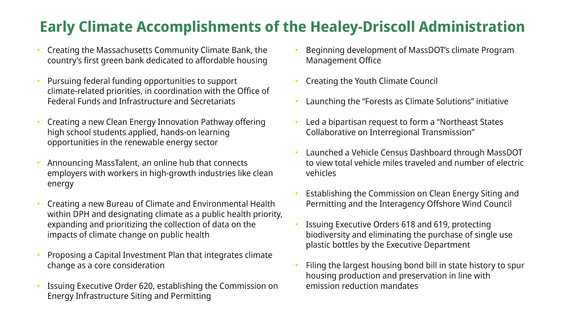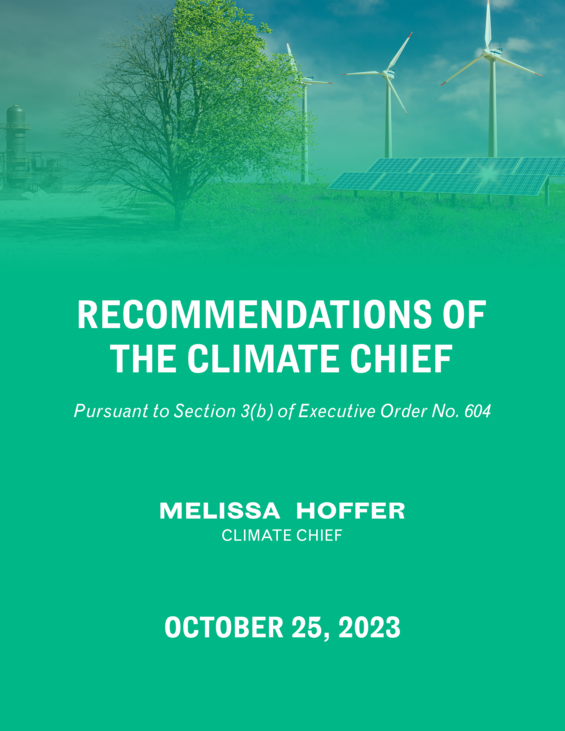Early Accomplishments
On her first full day in Office, Governor Healey created the Office of Climate Innovation and Resilience and appointed Melissa Hoffer as the nation’s first cabinet-level Climate Chief. Over the past ten months, the Climate Office has established active collaboration and partnership with all Secretariats and the Healey-Driscoll administration has demonstrated a clear and consistent commitment to address climate change, including by:

Recommendations
With an unprecedented level of interest in climate action, including with investments from the federal government and partnerships with the private sector, local governments, public health, academia and philanthropy, the task of the Climate Office is to build new and effective frameworks for action. This report makes the following recommendations to build on the Commonwealth’s climate-related plans.
Funding
All agencies must think creatively about ways to leverage innovative clean energy, decarbonization and resilience funding tools to support policy goals. Massachusetts should prepare economic analyses of the investment needed to achieve both the greenhouse gas emissions reductions within the Clean Energy and Climate Plan (CECP), including the 2050 Net Zero mandate, and ResilientMass, the statewide hazard mitigation and climate adaptation plan. These analyses should be paired with specific funding and financing strategies. Agencies should analyze feasible policies that both reduce emissions and generate additional revenue streams to invest in further decarbonization. The Division of Insurance should accelerate its efforts to manage climate risk and resiliency for the Massachusetts insurance market.
Capital investment, asset management, grants, procurement, and environmental justice
Broadly speaking, discretionary state spending should align with and not undermine our CECP emissions reductions mandates. The administration prioritized climate and environmental justice considerations in the capital and operating budget development process and should now formalize a protocol for evaluating proposed capital projects to align with the CECP. Recommendations in the report include continuing to center environmental justice in climate policy and program implementation; implementing a statewide plan for electrifying the state-owned vehicle and equipment fleet; ensuring grant-making and other incentives are used as a tool to drive and amplify decarbonization and resilience efforts; and updating procurement practices to require disclosure of emissions and climate risk.
Emissions mitigation
The report presents a range of recommendations to reduce greenhouse gas emissions and achieve the mandate of Net Zero emissions in 2050. These include reviewing the best use of ratepayer funds currently allocated to Mass Save in light of existing building decarbonization needs and accelerating work to establish a decarbonization clearinghouse; issuing an annual climate report card on the state’s progress to meet CECP emissions reduction mandates; taking action to reduce aviation emissions; and ensuring new housing production and preservation and construction of new schools is consistent with building sector electrification and decarbonization mandates. Last month, the MBTA announced a new Climate and Resiliency Policy and Planning team that will be tasked with decreasing the Agency’s environmental footprint and increasing the resilience of the MBTA system.
Public health and resilience
Massachusetts must respond to the impacts that climate change is having and will have on our communities, ecological systems, built environment and infrastructure. The report’s public health and resilience recommendations include efforts to establish consistent guidance, standards and use of statewide climate science and data; develop and implement a Comprehensive Coastal Resilience Plan; prioritize investment to develop more energy resilient infrastructure, such as microgrids, that can maintain power to critical infrastructure during extreme weather events; and ready Massachusetts for the increasingly disruptive and dangerous impacts of climate change such as inland flooding, heat, migration, crop loss, droughts, and adverse health effects, including increased disease transmission and mental health issues.
Workforce
Massachusetts must build the workforce needed to power the clean energy transition and make communities more resilient. Recommendations include developing a comprehensive, cross-agency plan that includes measurable targets and goals to build a clean energy, climate, and resilience workforce. The report also calls for theestablishment of a Climate Service Corps to drive awareness, engage residents and institutions, and develop career paths integral to climate-critical solutions. The Climate Corps would provide volunteer opportunities and have programs focused on youth, preparing them for good-paying jobs in clean energy and climate resilience.
Economic development
Massachusetts should develop and implement a comprehensive clean energy and climate economic development plan that results in the creation of new, good paying jobs and further strengthens long-term economic growth. An investment strategy must ensure that climate tech companies have access to the capital required to innovate and scale in Massachusetts.
Education
Massachusetts should enhance its efforts to educate communities, including students, about the climate crisis. These efforts should include promoting a basic understanding of climate science and fostering the capacity of communities to deploy climate solutions. The administration will work to support the broad-based adoption by public school districts of a K-12 curriculum addressing climate change.
Read the Full Report
A PDF version of the full report is available to download here.
